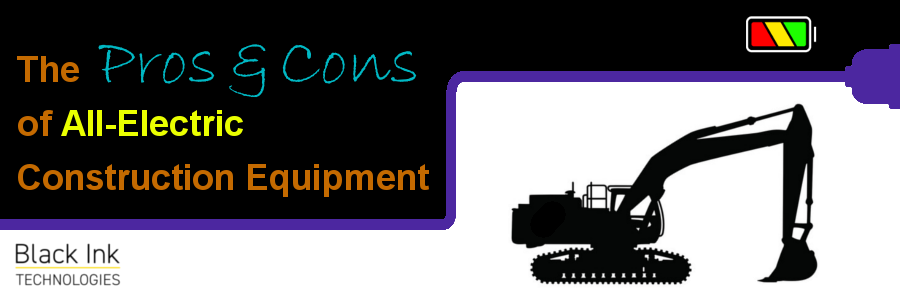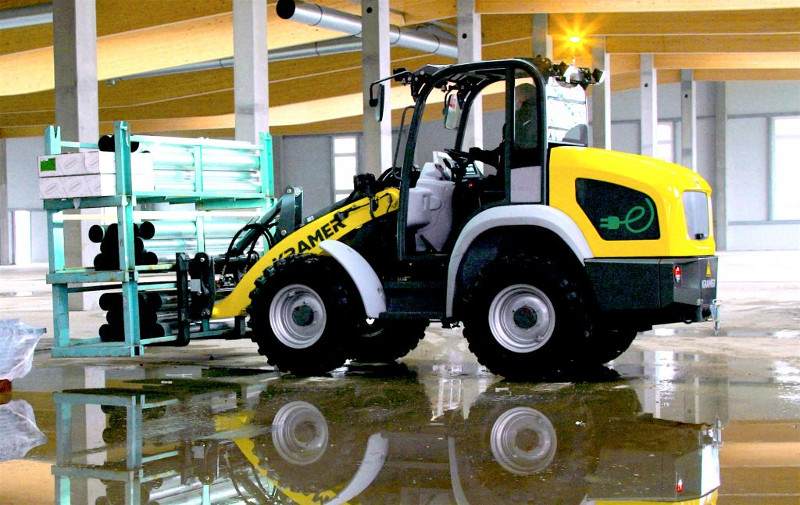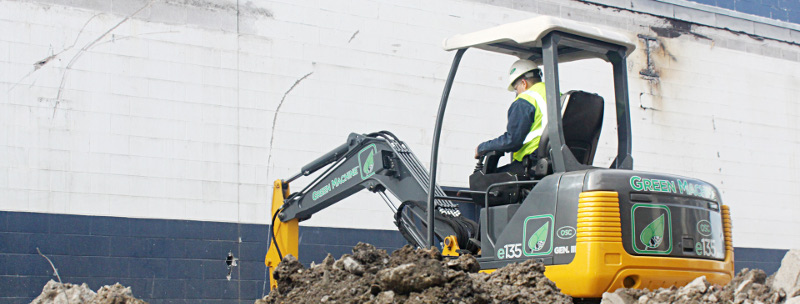The 'Pros & Cons' For Switching To Electric Construction Equipment”
by Black Ink Team

In addition to Industry 4.0, another major industrial revolution is under way: electric motors, the batteries that power them, and the chipsets that enable them to work efficiently are becoming cheaper, more powerful, and easier to make. This confluence of developments is paving the way for several industries to start innovating, the most well-known one being the automobile industry, but another that could one day have as big of an impact on our lives is the construction industry. However, there may be some side-effects to completely changing over, from diesel-powered engines to electrical motors, at present.
Diesel-powered equipment is still very much on top in terms of widespread use, but one day soon manufacturers, distributors, and/or dealers who solely deal in diesel-powered construction equipment may be looking at their CRM and wondering why their numbers stopped measuring up
More and more manufacturers are coming out with all-electric construction equipment every year. Hybrid options do exist on the market, but the following ‘pros & cons’ will only be dealing with all-electric equipment. According to Equipment World, the growth of this burgeoning new market is thanks in part to “reduced prices for digital signal processor technology, as well as increased production of rare-earth magnets.” Demand for emission-reducing products in general has also been helping to raise consumer interest in electric construction equipment.

And now, the list:
The Pros:
- Fewer emissions. In general, running electric motors contributes less to pollution than running internal combustion engines, since they do not directly rely on burning fuels. In addition to producing a safer environment, cleaner construction equipment (i.e. all-electric machines) may in the future save construction companies money by entitling them to emission-reducing tax incentives.
- Less noise. One of the biggest complaints that construction sites get from neighboring communities is that they produce a lot of noise. With quieter, electric machines construction sites can be put up in stricter areas and have longer workdays. In some jurisdictions, they can possibly even allow for sites to be run at night
- Lower maintenance costs. Internal combustion engines have large amounts of moving parts. In contrast, electric motors have very few, meaning there is way less that can go wrong. Electric construction equipment breaks down less frequently and requires fewer checkups. Construction companies who buy, lease, or rent these will end up spending less on maintenance, and will be slowed down less frequently by equipment downtime.

The Cons:
- Insufficient infrastructure. Around 60% of power in the US is currently being provided by coal and natural gas plants, thus negating the decreased pollution benefit that goes along with adopting electric construction equipment. Furthermore, in some cases it might require a huge initial investment to provide a site with enough power for it to dependably run a full array of all-electric equipment, especially if it is in a rural area. (Diesel powered equipment does not impose this problem, since liquid fuel can easily be transported.)
- Long recharge times. Batteries in heavy-duty electric-powered construction equipment take a very long time to recharge. This obstacle can be removed completely by swapping depleted batteries with fresh ones, but that is assuming all electric construction equipment will have that capability. Some of the base models that manufacturers produce probably will not have it built-in, as adding that increases cost. Furthermore, for the equipment that does have it, construction companies will have to spend money on secondary/tertiary batteries
- High cost. For the time being, electric construction equipment is a new product category and therefore will more often carry bigger price tags than traditional diesel counterparts. Furthermore, since the market for this type of machinery is smaller now than the one for diesel-powered construction equipment is, the cost for repairs is consequently going to be higher and there will be limited options for buying used. This negative will only affect early adopters, however, as prices will eventually drop and the number of repair centers/used dealerships will grow in the future.
